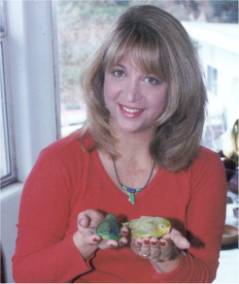Hi Sandee,I just recently adopted a 3yr old untamed Pacific Parrotlet. I have no experience with these birds and not sure where to start. I know he's a little stressed being in a new environment but he is eating. I plan to get his wings clipped next week and have stocked up on food and toys. The taming is where do I begin? I can't even put my hand in the cage without him having a fit. Should I allow him to adjust to his new surrounding as its only been two days? I just want to make him as comfortable as possible as its stressful for the both of us.
Thank you,
Kaye
What do you mean by ‘untamed’? Was the bird hand-fed and then put in with other birds? Or is this a parent-raised bird that has never been imprinted or socialized?
Sincerely yours,
Sandee L. Molenda, C.A.S.
Sandee,
I don't know much about his history. I was told when I got him that he was untamed. I do know that he was bonded to a mate that died a couple months ago. The previous owner mentioned trying to work with "Ezra" but had very little patience and gave up on him. The last week or so he seems to be settling in abit. When we're alone I close my bedroom door and allow him to come out of his cage and venture around which he really seems to enjoy. I talk and sing to him but he's still very jumpy, goes into attack mode when I try to change out his food. I have a little cozy corner that he attacks if someone comes near the cage. I'm not sure where to start or if I should just continue with what I'm doing...letting him adjust.
Kaye
All parrotlets are aggressive and territorial of their cages. Its part of their nature and how they were designed to survive in the wild. After all, they come from places where spiders are bigger than they are and they are eaten by almost everything so they must be very aggressive and protective in order to survive. I always tell people to teach your bird the ‘step up’ command and remove them from their cage before cleaning, changing toys, etc.
One of the reasons people like me hand-feed parrotlets is to imprint them. Parrotlets are not domesticated birds like cockatiels or budgies but are still very much wild animals that behave on instinct. If they are not imprinted on humans, they will not be tame. Hand-feeding parrotlets is extremely burdensome, time-consuming and labor intensive. Baby parrotlets need to be fed from the time they are 10 days old until they wean at 6 or 7 weeks of age every 4 hours, every day, all day. I charge $100 for a green Pacific and without counting the cost of food, electricity, vet bills, etc., I get paid less than $1 per bird per feeding. So we are obviously not getting rich doing this – it is because in order for these birds to be the best pets, they must be imprinted. After they are weaned, they bond with the person or bird they spend time with. If this bird was simply placed in a cage and ignored, it did not establish a bond with people so it probably is fearful of people since we are predators and they are prey. Again, its all about instinct and how Nature designed them to survive in the wild.
It is possible to tame a bird that has not been imprinted or handled but it takes a lot of time and patience. When we had wild caught birds, we would wrap them in a small towel and gently hold them talking to them, stroking them and getting them used to people. Sometimes it worked, sometimes it doesn’t.
So, there are no easy answers. I would make sure the bird’s wings are kept clipped, keep chatting and vocalizing to him. You can wrap him in a small towel and work with him while you are watching tv. All of these things may help, they may not. Only time will tell.
In the meantime, he does sound like he is getting more interaction and I’m sure you are taking excellent care of him. Perhaps he will come around enough to step up onto your finger or ride around on your shoulder. That would be a huge step forward for him but again its going to take time, consistency and patience on your part.
Best of luck and I hope this helps.
Sincerely yours,
Sandee L. Molenda, C.A.S.
Subscribe to:
Post Comments (Atom)




No comments:
Post a Comment
Note: Only a member of this blog may post a comment.